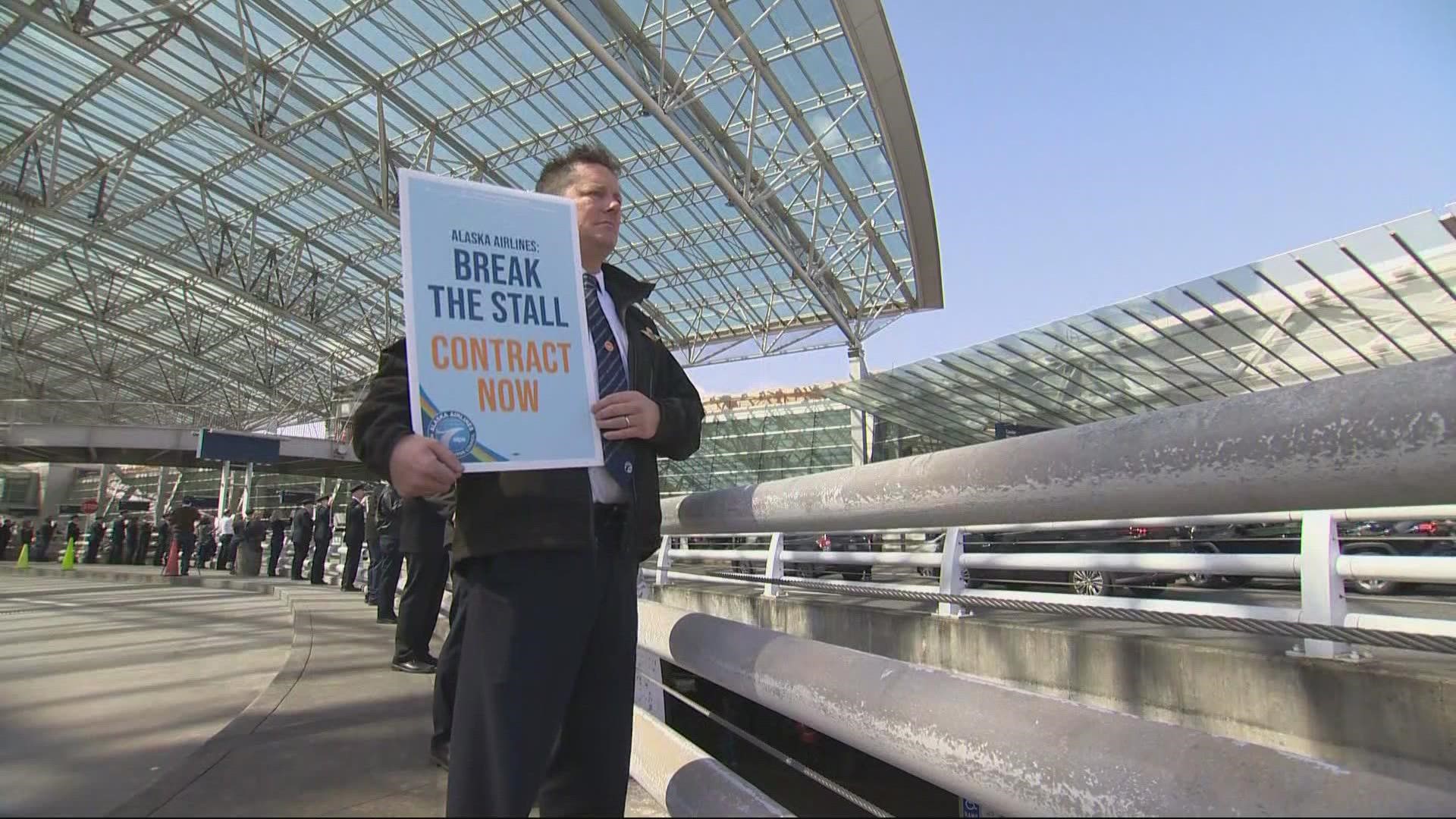PORTLAND, Ore. — Alaska Airlines pilots planned to hold a series of informational pickets at Portland International Airport (PDX) and other major West Coast airports on Friday, prompting the airline to cancel some flights due to a shortage of available pilots.
The online arrivals and departures board at PDX showed 11 canceled flights on Friday morning, all of which were Alaska flights. The airline said in a statement that it had canceled more than 120 flights nationally, which is about 9% of its total operation. About 15,300 flyers were impacted.
The bargaining actions come as air travel rebounds to pre-pandemic levels and demand is surging as many Americans head off on spring break for long-delayed vacations. Frustrated travelers vented on social media about botched vacation plans and reported that there was up to a 10-hour wait to speak with an airline representative about rescheduling flights. Many said they couldn't fly out for a day or two.
Robyn Dold, of Battle Ground, Washington, had planned to fly to Missouri on Friday with her husband, daughter and son-in-law to attend her father-in-law's funeral. The family received an email from Alaska at midnight — six hours before they were to take off — that said their flight was canceled.
Dold spent hours Friday on hold with the airline, and then in line at Portland International Airport, only to learn Alaska could not get them to the funeral on time — or even to a city within 10 hours' driving distance.
"We’d go with the flow if it was a vacation, but this is something that has a due date that we can’t change and it’s heartbreaking," she said in a phone interview. "My husband is beside himself. His father was his very best friend."
Dold, who was to deliver the eulogy, will instead watch the funeral on a one-way livestream with her husband from home, she said.
"What I think really irritates me the most, honestly, is that we weren't given any notification ahead of time that this was a possibility. We could have made other arrangements ahead of time if they had said, 'Hey, you know, the pilots might go on strike April 1,'" said Dold, who said she didn't know enough about the contract negotiations to pass judgment on the strike. "That's what's really disappointing."
The protests were planned for Portland, Seattle, Anchorage, San Francisco and Los Angeles, according to a news release from the Air Line Pilots Association, International, the union that represents the pilots.
Each picket was preceded by a rally at a hotel near the airport in the morning, with the pickets at the airports themselves scheduled to begin at noon and run for two hours.
RELATED: Yes, 5G can interfere with airplanes, but it’s unclear whether it will cause ‘harmful interference’
Pilots with the association also protested last week in New York City outside the airline’s Investor Relations Day in a precursor of Friday's picket.
Contract negotiations between Alaska Airlines and the union have been underway for almost three years, according to the press release, and the pilots argued that the airline's current proposal lags behind contracts offered by other carriers and is "not competitive when it comes to attracting and retaining pilots."
The union said Alaska Airlines did not adequately prepare for a return to air travel after the pandemic and didn't take the necessary steps to retain or attract pilots as demand bounced back. Issues that still need to be resolved include job security, work rules and quality-of-life provisions that provide flexibility and reasonable schedules, the union said.
The company said that negotiations are still ongoing, with the next in a series of mediation sessions with the National Mediation Board scheduled for later this month. It said its current salary offers are competitive, with an average annual salary of $341,000 for captains.
"A new pilot contract remains a top priority for Alaska," Jenny Wetzel, vice president of labor relations for Alaska Airlines, said in a statement. "We’ve put a package on the table that’s competitive and addresses the issues most important to our pilots. It’s a significant financial investment in our pilot group while recognizing that we are still working to recover from $2.3 billion in losses from the COVID-19 pandemic. We are eager to conclude negotiations quickly so our pilots can enjoy these new benefits as soon as possible."

